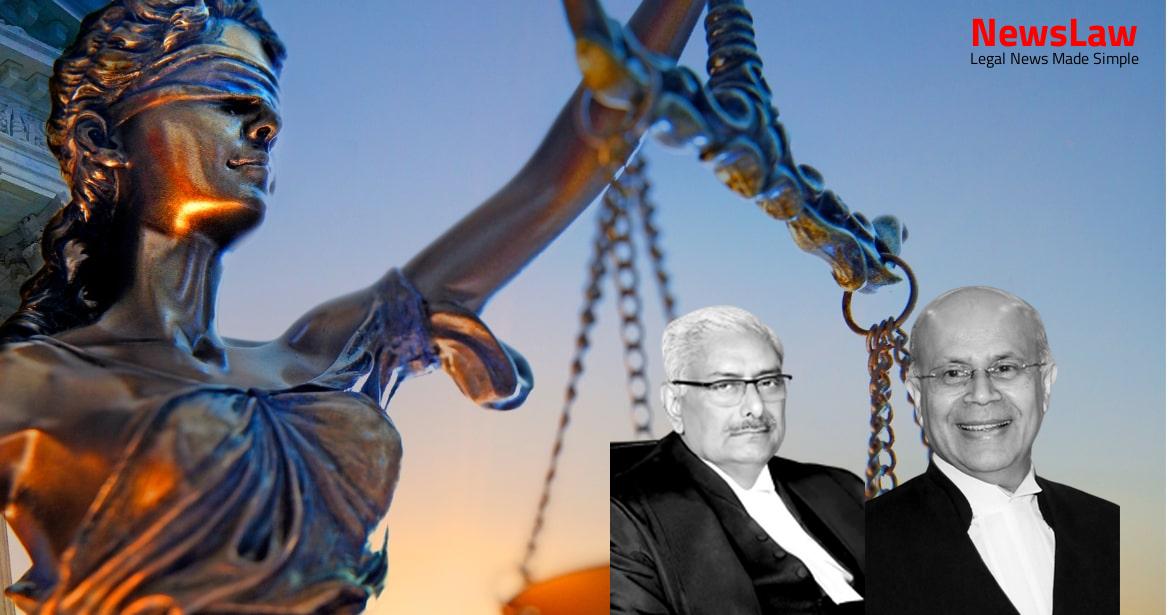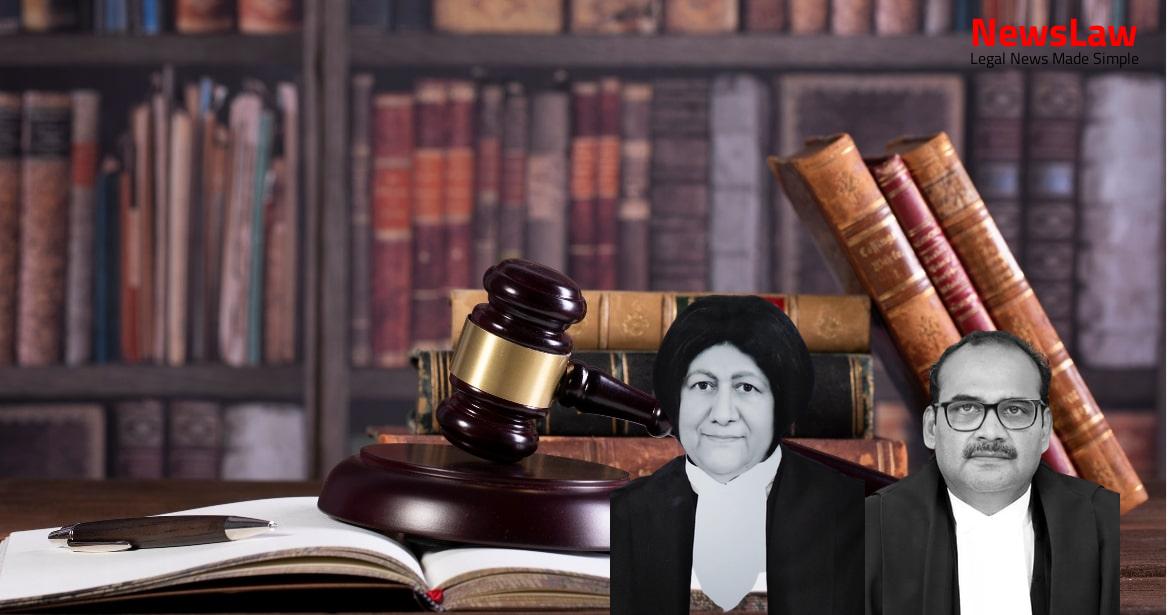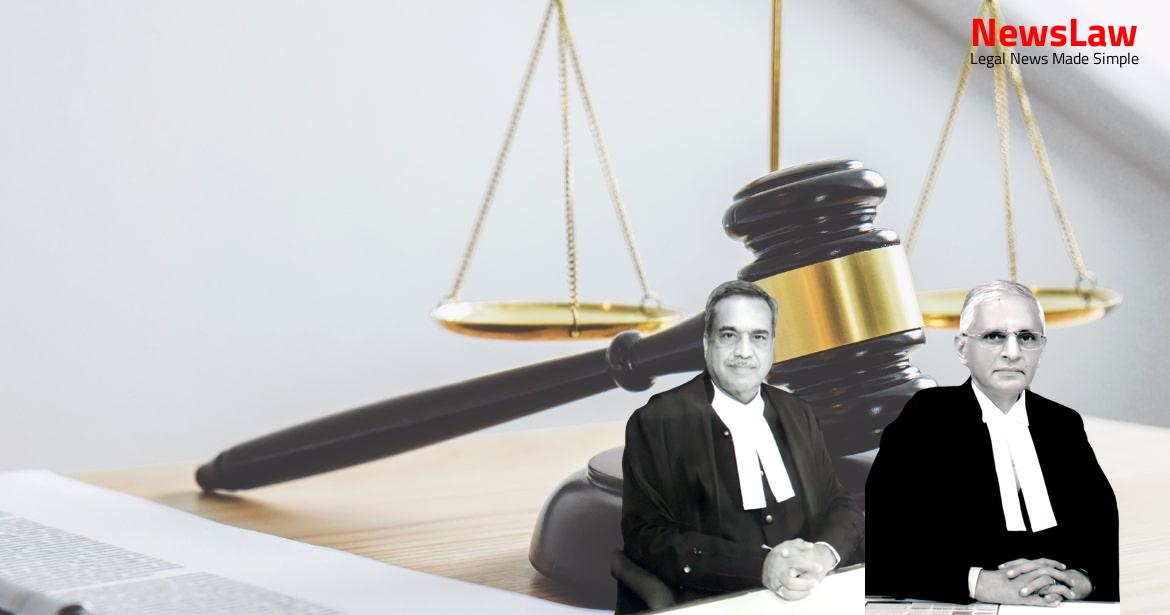The court’s in-depth legal analysis delves into the intricacies of shareholding and nomination rights within company law. The focus is on nominee entitlements, transmission of shares, and the implications of nominations on share ownership. This comprehensive review offers valuable insights into how the law interprets and applies rules regarding company shares and the rights of legal representatives in cases of shareholder demise.
Facts
- Respondent No.1 claimed eligibility to maintain the petition based on being a holder of 0.03% shareholding and claiming entitlement to 9.97% shareholding of M/s. Oswal Agro Mills Ltd. as the son of deceased Abhey Kumar Oswal.
- An application was filed challenging maintainability of the petition, arguing that the entire shareholding of the deceased was transmitted to Mrs. Aruna Oswal, making her the absolute owner of the shares.
- NCLT held respondent No.1 as the legal heir entitled to one-fourth share of the property/shares after the demise of Abhey Kumar Oswal.
- Respondent No.1 filed a partition suit claiming entitlement to one-fourth of the deceased’s shareholdings in two companies.
- Respondent No.1 also filed a criminal complaint against the appellant and officials of the companies regarding alleged illegal transmission of shares.
- The High Court ordered status quo on shareholding, maintaining Mrs. Aruna Oswal as the owner of the shares during the suit proceedings.
- Respondent No.1 was accused of indulging in forum shopping and entering corporate offices with his wife post the demise of Abhey Kumar Oswal, leading to a criminal complaint.
- NCLAT dismissed appeals against NCLT’s decision on maintainability of the company petition.
Also Read: Legal Analysis of Change in Law Compensation in Power Purchase Agreements
Arguments
- The NCLT and NCLAT overlooked the rights of the deceased shareholder that would vest in the nominee.
- The provisions of section 39 of the Life Insurance Act, 1938, differ from section 72 of the Act.
- A civil suit on the ownership of shares had been filed earlier and relates to the issue raised in the company petition.
- Referenced the case of Smt. Sarbati Devi v. Smt. Usha Devi regarding rights of a nominee in the Life Insurance Act, 1938.
- Due to the provisions of section 72 of the Act, all rights vested in Mrs. Aruna Oswal, the appellant.
- Respondent No.1 had settled in Australia and was not involved in the company’s management.
- Mr. Abhey Kumar Oswal died intestate.
- The application was deemed not maintainable under sections 241 and 242 of the Act due to insufficient shareholding.
- Legal representatives were granted the right to maintain the application on oppression and mismanagement.
- The decision in Vishin N. Khanchandani v. Vidya Lachmandas Khanchandani was referred to regarding nominee rights.
- Respondent No.1 could not claim any interest in the shares due to nomination under section 71 of the Act.
- Shareholding purchased by respondent No.1 after filing the civil suit did not give him the right to maintain the company petition.
- The nomination was made only to hold the shares for the benefit of legal representatives.
- The NCLT and NCLAT rightly held the petition to be maintainable.
- Maintaining a company petition would not be appropriate.
- The effect of nomination under section 72 of the Act was discussed.
- The civil suit’s pendency does not hinder the application concerning oppression and mismanagement.
- Argument made regarding respondent No. 1 having only one-fourth interest in the shareholding.
- Legal representative can maintain proceedings for oppression and mismanagement, even if not registered as a share owner.
- References made to various court decisions supporting the maintainability of the application.
- It was argued that the waiver requirement to hold 10% shares had been pleaded by respondent No.1.
- Filing successive petitions for the same relief was considered an abuse of process of law.
- The argument regarding the non-obstante clause in section 6 was rejected.
Also Read: Fair Investigation in Criminal Cases: Legal Analysis
Analysis
- The involvement of the company in litigation should not be taken lightly if the petitioners represent a body of shareholders holding the requisite percentage.
- Civil courts have the jurisdiction to determine the right, title, and interest in an estate in a suit for partition.
- Parallel proceedings on the same issue are not appropriate, and the application may not be maintainable in such cases.
- The decision in a civil suit regarding the right, title, or interest is binding between the parties.
- Rules that are vital and go to the root of the matter cannot be broken.
- Prima facie shares vest in a nominee by virtue of nomination, making them the absolute owner of the securities.
- A nominee becomes entitled to receive dividends, interests, and other benefits of the securities upon nomination.
- Legal representatives of a deceased member whose name is on the register of members are entitled to petition under Sections 397 and 398 of the Act.
- The legal representatives can maintain an application regarding oppression and mismanagement without being registered as a member.
- The question of nomination and its effect is considered a civil dispute and cannot be decided in the specific proceedings mentioned.
- Section 72(1) allows holders of securities in a company to nominate a person to whom their securities will vest in case of death.
- The nominee, if entitled to the securities, will receive all rights in the securities upon the death of the holder.
- Section 19(8) ensures that a nominee who becomes entitled to securities due to the death of the holder will receive all dividends and benefits associated with the securities.
- The Board has the right to decline or suspend registration if the nominee elects to be registered or transfer the share.
- A notice must be given by the nominee within ninety days to comply with the Board’s requirements for registration or transfer.
- Section 72(3) states that a valid nomination confers all rights in the securities to the nominee upon the death of the holder, unless varied or cancelled.
- If the nominee is a minor, the securities holder making the nomination can appoint a person to receive the securities in case of the nominee’s death during minority.
- Various sections of the Act and Table A of the English Companies Act provide rules regarding membership, transmission of shares upon death, and transfer of shares by legal representatives.
- Section 41 of the Act confirms that subscribers of a company’s memorandum are deemed members upon registration, and others become members upon written agreement.
- Section 109 of the Act validates transfers of shares by the legal representatives of deceased members, even if the representative is not a member.
- Articles 25 to 28 of Table A deal with the transmission of shares upon a member’s death, specifying the recognition of the survivor in joint holdings and legal representatives in sole holdings.
- Disputes related to inheritance of shares are considered civil disputes and do not fall under oppression or mismanagement under sections 397 and 398 of the Companies Act.
- The question of ownership of shares is not within the scope of Section 397.
- The nomination of shares is subject to the claim of heirs under the law of succession.
- Locus standi to entertain petitions under sections 241 and 242 of the Companies Act, 2013 was discussed in a related case.
- Legal representatives were eager to have their names on the register of members after the original member’s demise, who held a controlling interest.
- The petition’s basis involved claiming inheritance of a shareholding which cannot be decided under sections 241 and 242 of the Act.
- The nominee’s rights are determined by statutory provisions, especially in cases of nominations under Section 71 of the Companies Act, 2013.
- The respondent’s entitlement is in question due to a pending civil dispute.
- The respondent should have waited for the decision in the civil suit regarding shares before initiating NCLT proceedings.
- Given the minuscule extent of holding (0.03%) acquired after filing the civil suit, the NCLT proceedings under sections 241 and 242 should not be entertained.
- Transactions alone do not indicate oppression and mismanagement in this case.
Also Read: Lack of Locus Standi in Appeal Decree: Court’s Legal Analysis
Decision
- Dropping of proceedings filed before the NCLT regarding oppression and mismanagement under sections 241 and 242 of the Act is directed with the liberty to file afresh if necessary.
- If the civil suit is decreed in favor of respondent No.1, the proceedings can be refiled if the shareholding of respondent No.1 increases to the required extent.
- Impugned orders passed by the NCLT and NCLAT are set aside, and the appeals are allowed.
Case Title: ARUNA OSWAL Vs. PANKAJ OSWAL (2020 INSC 448)
Case Number: C.A. No.-009340 / 2019



